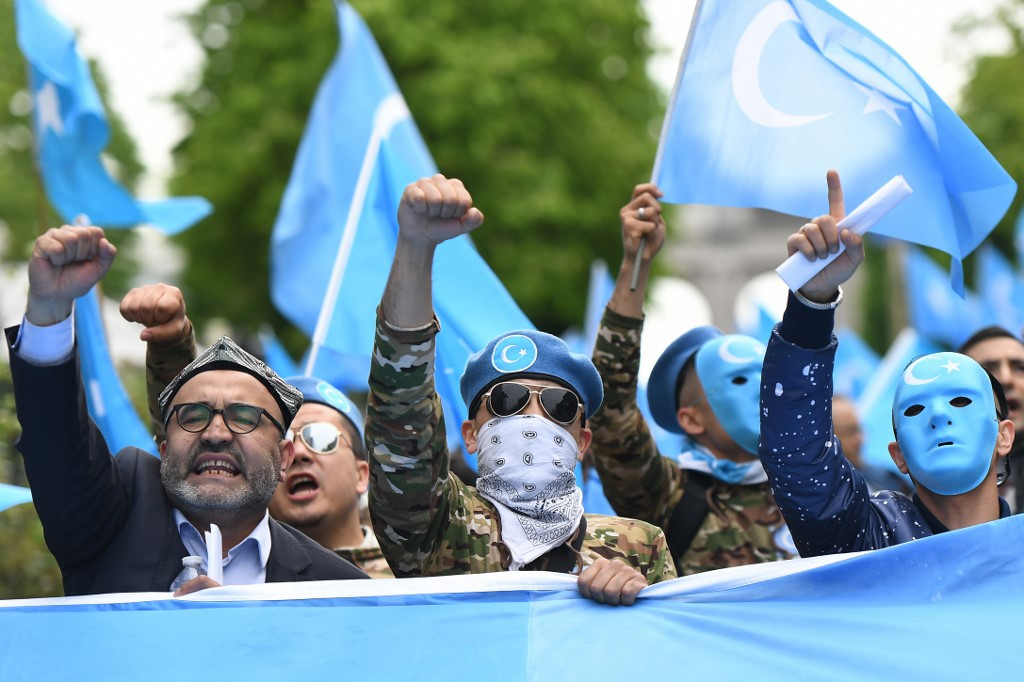Muslim world’s deafening silence on China’s Uighurs
Leaders of Pakistan, Saudi Arabia, and Sudan either have power to gain from China’s friendship, or they have value to lose in condemning the Chinese government.
Change text size
Gift Premium Articles
to Anyone

R
eflective of complex times when narrow national interests surmount ideological and religious ones, a dozen Muslim nations that accuse the world of “Islamophobia”, are selective in their criticism of fellow-Muslims being suppressed.
Individual Muslim nations and collectively, the 54-nation Organization of Islamic Countries (OIC), has over the years have muted their stand on Palestinians and on Myanmar’s Rohingyas. The most glaring is their silence on the Uyghurs, the Muslim ethnic in China’s Xinjiang province.
The silence is deafening since most OIC nations, individually, have joined the Belt and Road Initiative (BRI), China’s multi-billion development vehicle.
An estimated 11 million people are being subjected to neglect, discrimination, physical violence, social and economic ostracizing and forced separation of families, with adults being sent to schools for reorientation being run by the Chinese Communist Party.
While some may lend lip service, other Muslim nations are explicit in their support to Beijing. The 37 nations that jointly supported China on the Uighur issue at the United Nations in August last year included several nations who dominate the OIC, like Saudi Arabia and Egypt.
Some allow their ulema, the Muslim clergy to talk about the issue at Friday prayers in mosques, but as governments, they maintain silence so as not to annoy China.
The most glaring example is Pakistan. It is "not bringing up Uighur repression because 'China has helped us” Prime Minister Imran Khan has said. “...we are really grateful to the Chinese government, and we decided that whatever issues we will have with China, we will deal with them privately," he said in an interview in January 2020 while attending the World Economic Forum at Davos, Switzerland.
Khan was speaking to Foreign Policy magazine, and was pointedly asked why he had not said anything about Uighurs even though he was a vocal critic of anti-Muslim actions in India and elsewhere.
At the UN, there is a dividing line between defenders and critics of the Chinese state’s actions in Xinjiang. At the end of October, 23 countries including France, the UK and the US denounced the repression of the Uighurs at the UN Committee on Social, Humanitarian and Cultural Affairs. Nevertheless, Beijing won the support of 54 countries, who praised the Communist Party’s management of Xinjiang.
The undeclared yardstick for all, especially the OIC, is to see who will be hurt/offended by the protests. Thus, only the lip service to the Palestinian issue since the West and Israel are ranged against it.
But it is easy to pressurize Myanmar. In 2017, the OIC responded very differently to the Myanmar military’s crackdown on the country’s Rohingyas. Many Muslim countries – including Saudi Arabia, Iran and Turkey – rallied to the defense of the Muslim minority group in Myanmar. Indeed, the OIC took an active role in condemning the treatment of the Rohingyas at the UN Human Rights Council in Geneva.
In contrast, Saudi Arabia expressed its “respect” for Chinese leader Xi Jinping before signing major commercial contracts. Egypt, which wants Beijing to finance its infrastructure, went so far as to allow Chinese police to come and interrogate Uighur exiles on its soil in 2017.
For a long while, Turkey was the exception to this silence on China’s actions in Xinjiang. Most notably, Ankara decried the detention of Uighurs in “concentration camps” as a “great cause of shame for humanity”. But since then, Recep Tayyip Erdogan’s government has enacted a U-turn: focused on trade talks with Beijing, the Turkish president refrained from signing the 22 states’ letter condemning the repression in Xinjiang.
In her analysis for CNN, producer Tamara Qiblawi primarily cites that countries such as Saudi Arabia are looking to protect their own futures. “Economic interests reign supreme… Ideological differences proved no barrier to doing business,” Qiblwai wrote. The obvious need for strong economic relations with the superpower that is China has seemingly trumped “religious differences.”
China is currently Saudi Arabia’s biggest trade partner. Countries like Turkmenistan and Tajikistan, who also supported China in the UN letter, likewise depend on Chinese trade for economic uplifting.
Leaders of Pakistan, Saudi Arabia, and Sudan either have power to gain from China’s friendship, or they have value to lose in condemning the Chinese government. Azeem Ibrahim, a director at the Center for Global Policy, alleges that condemning China is taboo in Pakistan. Ibrahmin further believes that China is “very convenient for [these countries] politically.”
As critics like Qiblawi and Ibrahmin have pointed out, these countries seem to be operating under political motivations. These Muslim countries’ exoneration and denial of China’s human rights violation appear to be politically driven, more so than representing the views of the Muslim majority.
***
The writer is retired Indian Air Force officer, who has completed post-graduation in English honors.









